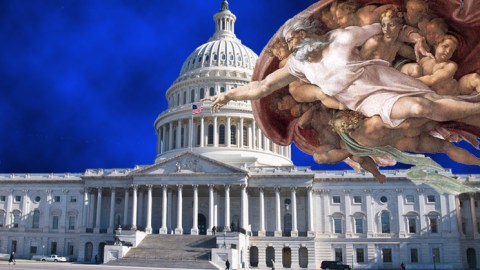Are there any openly atheist politicians in America?

Debating the authenticity of religious sentiment has never been easy. What applies in one circumstance is suddenly null and void in another. How else to explain the fact that, despite credible allegations of numerous affairs, Donald Trump has just now reached his highest level of support among white evangelicals?
The mismatch between moral certainty and professed belief has reached absurd levels. As popular evangelical pastor Robert Jeffress recently told Fox News:
Evangelicals still believe in the commandment, Thou shall not have sex with a porn star. However, whether this president violated that commandment or not is totally irrelevant to our support of him.
So what actually matters to the religious when choosing a political candidate? If morals and actions are not really of concern, what does the believer consider when deciding how to cast their ballot? Incredibly, there is one immediate disqualification in over half of the American public’s mind: atheism.
The American government reflects that. Over 90 percent of members in Congress identify with some form of Christianity, 20 points above the number of American adults who claim the same. No one openly claims atheism, although Arizona Democrat Krysten Sinema says she is “religiously unaffiliated”—the American public is at 23 percent with that claim.
The only open atheist in congressional history was California Democrat Pete Stark, who spent three decades in Congress before admitting to his lack of faith. Five years later he lost his seat, though it doesn’t appear faith played a role. In fact, he initially finished ahead of Eric Swalwell in a Democratic primary during a redistricting election before losing to him in the general election in 2012.
Barney Frank, a former Democratic congressman from Massachusetts, was the first openly gay member of Congress. Though he came out back in 1987 and served until 2013, he never admitted his lack of faith. In 2014 he told Religion News Service:
So I decided, ‘I’m not going to do this. I’m not going to pretend.’ During my service [in Congress] I never pretended to be a theist. It just never became relevant that I wasn’t, and I guess I was not as conscious of the discrimination nontheists felt.
Frank admitted he simply wasn’t interested in theology, that he’s “not interested in guesses.” He never allowed non-belief to affect policy decisions, nor did he discriminate anyone due to their religious choices. While another’s faith is not an essential feature for roughly half of Americans, 51 percent are stuck on what a person says they believe instead of how they act or what policies they put forward.
Shortly after Frank admitted to his lack of interest in religion, an openly atheist candidate, James Woods, ran for Congress in Arizona’s 5th District in 2014. He was defeated soundly in that Republican-leaning district. But he decided not only to not run from his atheism but to use it as a springboard in explaining why he was seeking office, though he did frame it from a humanist perspective:
Humanism requires that we treat everyone [with] dignity and respect. That we stand up for equality. That we govern compassionately. That we listen to what people need. We need to shift toward progressive Humanist values to address human suffering.
In 2017, Jamie Raskin was elected to represent Maryland’s 8th District. He too claims humanism as the basis of his belief system but avoids the term “atheist” and points to his Jewish heritage. In fact, even though he said he’d never answer if he believes in God in the public sphere, he’s also stated:
I’ve never pronounced upon the existence of a divinity before, and nobody has ever asked me.
Raskin isn’t the only one to avoid the question entirely (sort of). Besides Sinema claiming no affiliation, nine other Congressional members either said they didn’t know or refused to answer in 2015. Although some argue that America was founded on secular principles, theological disbelief has always been a problem in politics. As professor Leigh E Schmidt writes of this phenomenon:
The proposition that the ungodly are not up to the demands of virtuous citizenship has been an abiding concern, a commonplace of American political discourse from the founding.
Yet we’re experiencing anything but virtue in our discourse today. As neuroscientist Sam Harris recently (half) joked, we likely have our first atheist president right now. While the validity of this can be debated, what cannot be so readily explained is why the most religious group in America is supporting someone living a life in direct opposition to their proclaimed value system by a three-to-one margin.
Interestingly, in 2016 faith played a minuscule role in national politics. While Bernie Sanders also avoids discussing atheism, his professed allegiance to humanism is telling. As he stated in 2016:
To me, it means that all of us are connected, all of life is connected, and that we are all tied together… What my spirituality is about, is that we’re all in this together.
Should we elect more atheist politicians? An honest appraisal of their policies and actions is the most important aspect of choosing who to check on the ballot. This might seem a tall order during a time when presidential elections are popularity contests. Whatever one’s belief system is should not matter provided they perform their duties as faithful public servants.
It’s not that we necessarily need more atheist leaders, but we do need candidates and sitting members to not be scared to admit their lack of faith when asked. That requires an intellectual and emotional maturity on the part of the public that we have yet to see. If we’re going to ask for their honesty, we also have to question our own.
—
Stay in touch with Derek on Facebook and Twitter.





